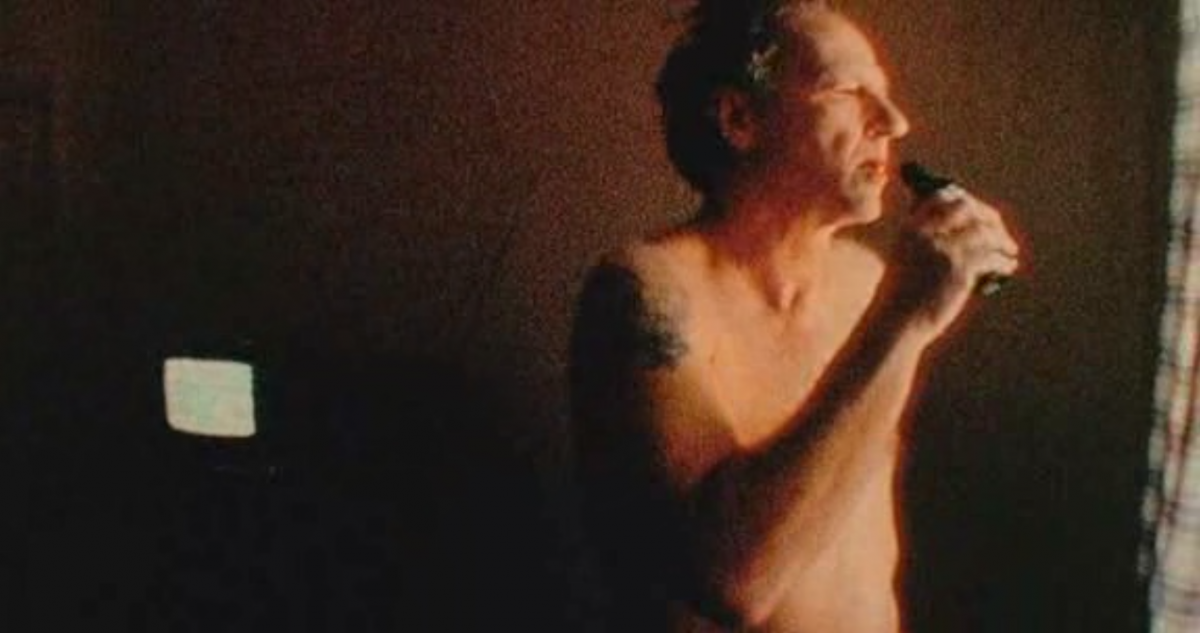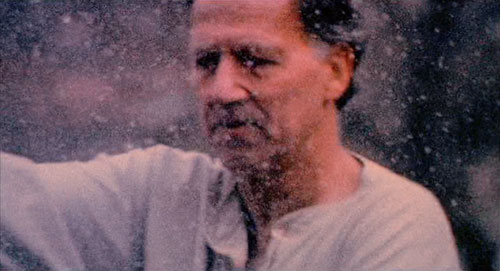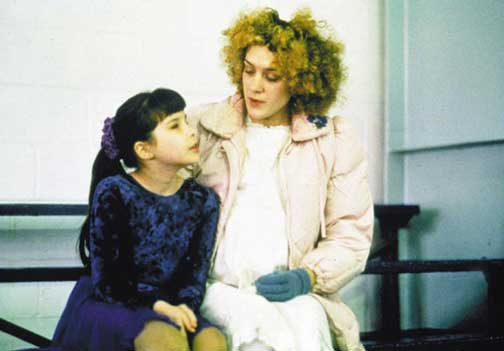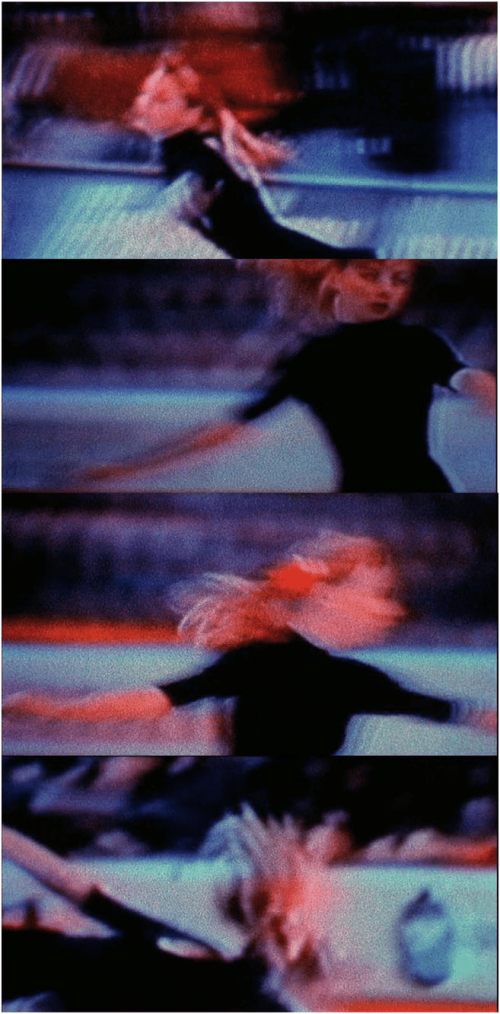I feel compelled to write this blog post because I’m frustrated and upset at my inability to do other things right now, so apologies if it’s blunt or inelegant. I'm not going to do any musical analysis or have any smart thoughts. Maybe I'll do that stuff again soon.
Earlier this year, I watched Julien Donkey-Boy. I don’t want to make a case for it as “a good film” aesthetically or politically, but I was deeply moved by it and I would highly recommend watching it. Julien’s father (played by Werner Herzog) is consumed with bitterness and self-hatred, which he inflicts in turn on his three children. He hates Julien’s “artsy-fartsy” poetry, he insists Pearl is a “dilettante” who will never be able to play the harp, but his fixation is on the youngest, Chris, whom he subjects to an abusive training regimen so he can be a “winner” at wrestling. At his most grotesque, he orders his family members to berate each other on his behalf, making them internalise their insufficiency more deeply. It becomes clear that his resentment stems from his failure to become a champion ski jumper: he was never good enough for others, for himself, and so his children can never be good enough for him.

In one scene, the father is visited by his friend, a man who was born without arms. The friend performs card magic with his toes, consistently flipping an ace off the top of the deck and attributing his luck to a positive attitude; the father angrily insists that he’s cheating and rejects his encouragement. Meanwhile, on the television, a figure skater performs a routine to Puccini — footage which bookends and recurs throughout the film — and the friend jokes: “she’s got magic toes, too, but hers are in skates”. Later, a hired magician performs some unbelievable feats with cigarettes at a party. When someone performs to a high ability, it can be astonishing, like magic. Even everyday tasks or menial labour can become a spectacle in themselves when performed with enough skill and flair, though they are mostly unseen and taken for granted… Ability is often valued more than the person who is able; those who are seen to lack ability are often ignored or shamed.

But, of course, an individual can have differing levels and qualities of ability. The armless friend returns in another short scene, playing a drum kit while a woman dances, the two of them having a wonderful time; he is physically disabled but supremely able in other respects. One of my favourite scenes in the film — it’s so warm and joyful — takes place at an underfunded school for the blind where Julien works as an aide. A group of young blind people share their experiences of disability and religion with each other; Julien (who is also disabled on account of his schizophrenia) listens and contributes; a child hesitatingly plays piano in the background, breaking into a melody from Pachabel’s canon at one point. And then one member of the group starts beatboxing, inviting others to freestyle and ad lib over him. Although the “Black Albino straight from Alabama” is the most talented rapper, they all take part in their own way and show appreciation for each other’s contributions. One kid ends his freestyle with “Go Victor! Go Julien! Go James!” and Julien gives him a loving hug. In that moment, in spite of poverty, neglect, and abuse, they’re all happy.
Sometimes I feel like most music is awful and shouldn’t exist. They should stop making new songs. There are already so many great songs, so if you can’t contribute to that canon of greatness then just do covers. Play standards. Everyone wants to be a fucking auteur nowadays. These are the words of The Cruel Aristocrat, a nasty guy who lives in my head and makes me feel nasty elitist things. Nothing is good enough for him/me: not my music, not my friends’ music, not any new music coming out. I think The Cruel Aristocrat made his presence known when I was trying to get down to the bottom of what makes songs good or not. My answer was that great songs distinguish themselves. It’s not a matter of complexity or sophistication, but more boldness, decisiveness, and the vague notion of “songcraft”, which has something to do with melody. I don’t like it when a songwriter or producer gives the impression of being on autopilot, or of having forgotten how to write songs. The Cruel Aristocrat makes for a harsh taskmaster with demanding, arbitrary standards to meet, and he makes me doubt the worth of my compositions. I don’t want to just add to the ever-expanding landfill of new music that gets churned out, taking up precious digital and physical space in the world. He mires me.

I feel like a different person when I teach piano, like I have a totally different, far more positive relationship to music. The Cruel Aristocrat is not present. I set my ego aside and help my students play the pieces they want to learn, all at their own pace. One aim is to make playing the piece as enjoyable and comfortable for them as possible, but this enables the further aim of making the piece sound as moving as possible within the student’s power (everyone has different hands and bodies). All music, no matter how much I’d disparage it in my private life, becomes equalised in potential for beauty. I learn to appreciate the smallest things in songs I would otherwise never dream of listening to. It makes me feel open and warm, especially when my students make tangible progress and have fun. I also experience this openness when I just play or sing music with others, as long as I let go of my high expectations. When I’m jamming with other teachers and kids in a band workshop, I don’t care if we’re playing The White Stripes, Radiohead, or Hozier. I’ve even enjoyed playing Taylor Swift!

The parallels between Julien Donkey-Boy and these different musical experiences should be obvious, but the film also makes me aware of my own dis/ability. I was diagnosed as autistic when I was 20, a few months after I had a horrible meltdown at university. At school, I was bullied a lot and suffered from increasingly frequent breakdowns which took me out of classes for days sometimes, but I made up for it with my academic and musical achievements, ticking boxes, showing ability. When I was 16 or 17, my father thought I might have schizophrenia, since I was displaying so many “negative symptoms”. I experience the maddening contradiction of being supremely able in some contexts but frustratingly unable to do other things. The one always threatens to negate the authenticity of the other in my mind; I forget just how able or disabled I can be. It’s worth keeping in mind the social model of disability, which maintains that it's social and structural barriers which disable people, rather than inherent insufficiency. When I’m happy and stable, I feel “normal”, but when I’m jolted back into awareness of my autism, it can feel horrible. I might start crying and struggling to speak at work, at the shops, or at a party. I start overanalysing my interactions with others, how I can’t start conversations, how I probably seem pathologically incurious and self-centred. I embarrass myself with my rigidity and need for control in certain aspects of my life, wondering to what extent it’s an autism thing and to what extent it’s inherited from my neurotic middle-class upbringing. Having received and internalised so much messaging as a child of being incredibly able — a musical “genius”, it was consistently declared — I can’t resolve that maddening contradiction. At my ugliest, I feel an arrogance and entitlement, which perhaps also has that middle-class, privately educated, cruel aristocratic character to it, though that nastiness rarely lingers, thankfully. But it still upsets me that I struggle to do things most people seem to take for granted.

Being a teacher with autism can be scary. It makes me doubt myself a lot. It's a job for a "people-person", someone with emotional resilience, someone mature and responsible, someone superbly organised. I was thrown into full-time piano-teaching in 2023 with very little training, no formal qualitications beyond my diplomas in piano performance, a fresh enhanced DBS certificate, and an immense amount of trust. For the most part, I loved it, and still do now I work part-time. Being able to share my love and excitement for music, seeing my students express enthusiasm, celebrating their achievements together, it's so wonderful. But without adequate support and confidence, I soon started having meltdowns. One of the worst felt like an acute psychotic break or dissociative episode in which I became a dog or a fox, a trapped animal certainly, not meant for the human world. After a coworker expressed her concern to our boss, it was a difficult and sensitive thing to explain; the animalism was metaphorical, of course, nothing to worry about, sir. I wanted to keep my job, even though I felt, on a fundamental level, that I wasn't cut out for it. (I hope this isn't too off-putting of an admission to any potential employers who might be reading this... I'm qualified now and feeling fine!) I had autistic students too; among them were my favourite and my most difficult students. Sometimes your autisms click and sometimes they clash. But to every one of my students I offered and still offer all my patience and all my grace. Why shouldn't I offer myself the same?
I suppose Julien Donkey-Boy grounds me. It shows me the best and worst parts of my psyche on blown-up 16mm-by-way-of-MiniDV-tape film. It reminds me that being a champion isn’t everything, and that I shouldn’t be ashamed of my struggles, nor should I wallow in resentment. There’s joy in the most exquisitely performed “high art” and the most amateur music-making. Somehow, Harmony Korine directed a film full of love.
